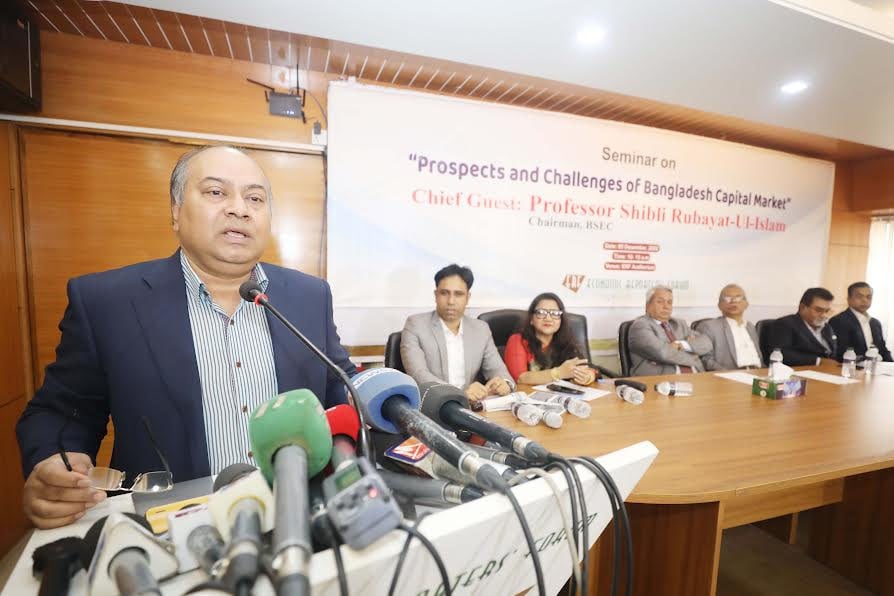
DHAKA, Dec 5, 2022 (BSS) - Commodity exchange once introduced in the country would eliminate the scope for under invoicing and over invoicing, said Bangladesh Securities and Exchange Commission (BSEC) Chairman Prof Shibli Rubayat Ul Islam.
"Work is going on to introduce commodity exchange in the country. If commodity exchange is introduced, then it will be possible to see both the international market and the scenario of the local market while staying inside the country," he said.
The BSEC Chairman said this while addressing a seminar titled "The problems and potentials of capital market in Bangladesh" as the chief guest today. Organized by the Economic Reporters Forum (ERF), the seminar was held at the ERF auditorium in the capital's Paltan area.
Presided over by ERF President Sharmeen Rinvy, Dhaka Stock Exchange (DSE) Chairman Md Eunusur Rahman, Chittagong Stock Exchange (CSE) Chairman Asif Ibrahim, Bangladesh Association of Publicly Listed Companies (BAPLC) former President Azam J Chowdhury and Bangladesh Merchant Bankers Association (BMBA) vice president Md Moniruzzaman spoke on the occasion.
ERF general secretary SM Rashedul Islam moderated the seminar.
Terming generating employment as one of the major problems of the country, the BSEC Chairman said, "We were working hard to accommodate suitable workforce in the better jobs with higher salaries. But, all of a sudden, the war started and thus put an impact on the global economy. The supply of the world's 2nd largest gas and fuel oil producing country has halted due to the war. The country which supplies the basic foods to other countries was also engaged in war. Subsequently, the impact started to put on other European countries."
He said whenever there is an impact on the fuel oil, then it put an impact on the global economy. "As a result of the shock following the start of the war, an unusual situation was created in the country as Bangladesh had to suffer from load shedding although there was surplus electricity. Although the country had been self reliant on food, but its people have been asked to remain prepared for facing future situations."
The BSEC Chairman noted that many big incidents took place across the globe over the last few months beyond the analysis and imagination of the common people. He said that the British Prime Minister has been changed for three times while the leadership of some four to five countries has also been changed. "But, we're yet to fall in such situation."
Turning to the capital market situation, Shibli said that Bangladesh did not receive such shock which it was supposed to experience owing to the global condition. He said although the institutional investors occupy around 80 to 90 percent of the capital market across the globe, but the situation is totally reversed in the country as around 80 percent investors in the capital market here are small investors.
"We need to take necessary measures to give protection to the small investors. That's why we've taken a temporary measure through floor price. But, it's not a permanent measure," he added.
The BSEC Chairman mentioned that if the commodity exchange is launched in the country, then anyone can know the price of rice in Ghana while staying in Bangladesh as well as which countries want to take Bangladeshi RMG items in what price.
"With commodity exchange, we'll be able to see the international market and the local market while staying at home for which there will be no scope for under invoicing and over invoicing," he noted.
DSE Chairman Eunusur Rahman while highlighting the various challenges of the capital market said that the number of knowledgeable investors in the country is very small.
"We often make investments after taking advice from others. This is a big challenge for us. Besides, the number of institutional investors and skilled workforce is also less here in Bangladesh."
Noting that the policy support in the country is still insufficient, he said that there is still cap on the bank interest rates which means that anyone can take loan from banks at 9 percent interest rate. But, large companies can take loans from the banks at 8 percent interest rate, the DSE chairman said adding that for this they might not go to the capital market as they would have to give dividend at a higher rate.
CSE Chairman Asif Ibrahim said that there is no commodity exchange in Bangladesh considering the overall size of the economy. "We'll ink agreement very soon with the Indian multi commodity exchange. We've already sent the draft rules to BSEC in this regard. If we get approval, then hopefully we'll be able to launch here commodity exchange."
Former ERF president Sultan Mahmud and general secretary Ziaur Rahman spoke, among others, on the occasion.